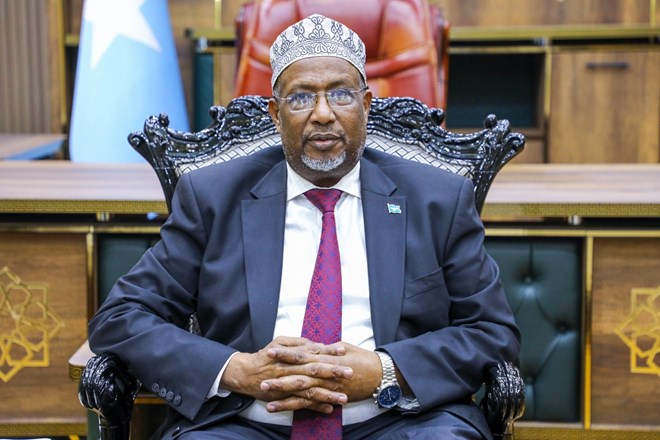
Hiiraan Online
Today from Hiiraan Online:
Somali Music
Google Plus
advertisements
Madobe: Somalia at strongest point since collapse, but Al-Shabaab remains key threat
FacebookFacebook messengerTwitterWhatsAppLinkedInTelegramEmail
Wednesday September 17, 2025
Adan Mohamed Nur Madobe, the Speaker of the House of the People, Federal Parliament of Somalia. Photo: Federal Parliament of Somalia
Mogadishu (HOL) — Somalia’s Speaker of Parliament Aden Mohamed Nuur Madobe says the country has made its most significant gains since state collapse in 1991, but warned that Al-Shabaab remains the single greatest obstacle to achieving lasting stability.
In an interview with the UNDP at his Mogadishu office, Madobe pointed to recent milestones: securing debt relief, lifting international sanctions, and advancing constitutional reforms that could deliver Somalia’s first one-person, one-vote election in more than 50 years.
“When we first started building the government, we were in a situation where we had nothing to get it moving—it was like a car without tires,” Madobe said. “But now, we’ve reached a point where the issue is just a weak battery—all we need is a jump-start.”
Madobe credited the 11th Parliament with completing reviews of four chapters of the provisional constitution, a step toward finalizing a national charter. He also noted Somalia’s endorsement of direct elections, a break from decades of indirect, clan-based voting.
The speaker said the government has unified the Somali National Army across most of the country, expanded federalism to all districts, and ensured representation in parliament. “No Somali district today stands outside the federal system,” he said. Somaliland’s political status and Puntland’s security integration remain unresolved.
Madobe said debt forgiveness and arms sanctions relief were defining moments in his career. “From that moment on, our armed forces were placed on par with the rest of the world’s armies—our national army is now recognized as equal to international forces,” he said. “The national debts were also forgiven, and that truly brought me great joy.”
Despite these gains, Madobe said Al-Shabaab continues to undermine progress.
Madobe said Al-Shabaab continues to block progress by controlling roads, intimidating civilians, and taxing local economies.
“Today, if a government official or someone with a mission wants to travel to Kismayo or Baidoa, they are forced to take a plane,” he said. “The security forces who are supposed to ensure safety cannot reach the areas—who controls the middle ground? Al-Shabaab. The people are living in fear and terror.”
He added: “Today, if we visit villagers in any part of the country, Al-Shabaab will come afterward and say, ‘Yesterday, we saw that you sat with the government troops, welcomed them, and even gave them water.’ That is the biggest issue.”
He said Somalia’s reliance on the U.S. dollar reflects the collapse of the national currency, further destabilized by Al-Shabaab’s financial networks.
Madobe praised international organizations and donors for sustaining Somalia’s fragile recovery but warned that international fatigue risks derailing Somalia’s gains.
Adan Mohamed Nur Madobe, the Speaker of the House of the People, Federal Parliament of Somalia. Photo: Federal Parliament of Somalia
“Sometimes we ask ourselves: have the people and the international organizations that used to support us grown weary of supporting Somalia’s state-building process?” he said. “We do feel a bit of a sense that people are feeling tired, that there’s a feeling like, ‘these people are being helped and supported, but there’s little progress being made.’ That feeling exists among us to some extent. However, overall, the support to the country is still continuing.”
He added: “Now we’ve reached the final stage, with only one step left to score the final goal. That’s exactly why we need support now, and that feeling is something we are experiencing collectively at the parliament.”
He credited the United Nations and donor governments with sustaining reconciliation efforts and parliament’s constitutional work, but said sustained commitment is needed to carry the process to completion.
With more than 70 percent of Somalis under 30, Madobe said the country’s future depends on stopping irregular migration, addressing youth unemployment and preventing radicalization.
“Those whose minds are influenced and taken over by Al-Shabaab, and who are turned into fighters, are also the youth,” he said. “Those who migrate illegally every single day are the youth. Truly, they need to gain the confidence to stop risking their lives through irregular migration, to reject being recruited as soldiers by Al-Shabaab, to pursue education, and, if they are to become soldiers and take up arms, let it be in service of their nation.”
He said the government’s ability to employ young people is limited by its reliance on donor funding. “The current government genuinely wants to engage the youth, but it doesn’t have the financial means to do so. Hiring new employees has been blocked, and the reason behind this is the country’s budget situation,” he said.
Madobe said he hopes his legacy will be tied to reconciliation efforts and guiding Somalia toward its first democratic election in decades.
“I am remembered for the national reconciliation, specifically by the people in the region I come from and by the people across Somalia as a whole,” he said. “Back when the country was divided and people were killing each other through rebel factions, I was among those who called for unity. I was one of those who said, ‘Let’s stand together as Somalis. We are brothers and sisters; let’s not turn on each other or shed one another’s blood.’”
He added: “If we can add to that … I hope to be remembered as the one who contributed to make the one-person, one-vote election possible. This is what we are currently striving for, and if it leads to a successful election, it will go down in history as our legacy.”
Opinion| Privacy Policy|Sports|Somali Music|Somali Map
All Rights Reserved Copyright. © 1999-2025, www.hiiraan.com



